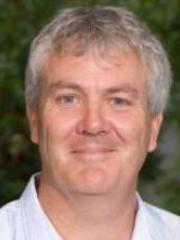Professor Mark Walker

Primary research interest
Infectious diseases and vaccine development
Additional roles
- Director, Australian Infectious Disease Research Centre
- Principal Research Fellow, National Health and Medical Research Council
Research focus and collaborations
My research focuses on the mechanism by which the group A streptococcus (Streptococcus pyogenes; GAS) causes invasive disease and GAS vaccine development. S. pyogenes is the etiologic agent of numerous suppurative diseases, ranging from mild skin infections such as pharyngitis, scarlet fever, impetigo and cellulitis, to severe invasive diseases such as septicemia, streptococcal toxic shock syndrome and necrotizing fasciitis. GAS is placed within the “top 10″ infectious disease causes of human deaths worldwide. Indigenous Australians suffer the highest rates of affliction with GAS diseases in the World. Of the over 100 M serotypes, the M1T1 clone which emerged in the mid-1980s and disseminated globally, causes most deaths and morbidity.
Projects and patents
Funded projects
- NHMRC Program Grant (administered by the University of Adelaide) 2015-2019 Proteins and glycans in host-pathogen interactions: targets for novel drugs and vaccines. (J.C. Paton, M.P. Jennings, M. von Itzstein, M.J. Walker, B. Kobe) $8,795,785
- NIH RO1 grant renewal 2015-2019 Defining the mechanism of group A streptococcal switching to invasive disease. (V. Nizet PI and M. Walker Co-I), US$1,833,750
- NCRIS/Bioplatforms Australia core funding 2015-2017 Broad spectrum drug targets of antibiotic resistant sepsis pathogens. M. Walker, M. Schembri, T. Stinear, J. Iredell, T. Sorrell, D. Strugnell, J. Paton and the Australian Bacterial Sepsis Consortium, $1,000,000
- NHMRC Principal Research Fellowship 2016-2020 (M.J. Walker)
Patents
- 1991: High level expression of unfused Bordetella pertussis filamentous haemagglutinin for production of acellular and live oral vaccines against whooping cough. D4111531 A1 German patent application filed, PCT/EP92/00814 international patent filed. Inventors: Dr. M.J. Walker, Dr. C.A. Guzman and Prof. K.N. Timmis.
- 1991: High level expression of Bordetella pertussis pertussis holotoxin in Bvg-negative Bordetella bronchiseptica for production of acellular vaccines against whooping cough. D4113385 A1 German patent application filed, PCT/EP92/00910 international patent filed, inventors: M.J. Walker, K.N. Timmis.
- 1992: Antigen-containing liposomes for oral immunization. D4136553 A1 German patent application filed, PCT/2729/59 international patent application filed, inventors: M.J. Walker, H. Brahmbhatt, R.M. Brownlie, D.C. White, J. Wehland, M.W. Fountain, C. Guzman and K.N. Timmis
- 2008: Group A streptococcal pharmaceutical compositions and methods thereof. PCT/AU2008/0011236 Australian Patent (filed 22nd August 2008) Inventors: M.J. Walker, A. Henningham, J. Cole
Teaching interests
I primarily contribute to the undergraduate subject Microbes & Human Health MICR3001, giving a series of lectures on bacterial pathogenesis and vaccine development.
Achievements and awards
Research awards and fellowships
- 1998: Alexander Von Humboldt fellowship
- 2005-6: Fulbright Senior Scholar fellowship (UCSD and University of Tennessee)
- 2009: University of Wollongong Vice Chancellor's senior researcher award
- 2013: Fellow of the American Academy for Microbiology
- 2014: NHMRC Development Grant Achievement Award - Top Ranked Grant
Teaching awards
- 2000: Australian College of Education (Illawarra/South Coast NSW Chapter) excellence in tertiary teaching
- 2003: University of Wollongong Vice Chancellor's award for outstanding teaching and learning in science
- 2003: Australian Society of Microbiology David White excellence in teaching
Featured publications
- Rivera-Hernandez, Tania, Pandey, Manisha, Henningham, Anna, Cole, Jason, Choudhury, Biswa, Cork, Amanda J., Gillen, Christine M., Ghaffar, Khairunnisa Abdul, West, Nicholas P., Silvestri, Guido, Good, Michael F., Moyle, Peter M., Toth, Istvan, Nizet, Victor, Batzloff, Michael R. and Walker, Mark J. (2016) Differing efficacies of lead Group A Streptococcal vaccine candidates and full-length M protein in cutaneous and invasive disease models. mBio, 7 3: e00618-16.1-e00618-16.9. doi:10.1128/mBio.00618-16
- Barnett, Timothy C., Cole, Jason N., Rivera-Hernandez, Tania, Henningham, Anna, Paton, James C., Nizet, Victor and Walker, Mark J. (2015) Streptococcal toxins: role in pathogenesis and disease. Cellular Microbiology, 17 12: 1721-1741. doi:10.1111/cmi.12531
- Ben Zakour, Nouri L., Davies, Mark R., You, Yuanhai, Chen, Jonathan H. K., Forde, Brian M., Stanton-Cook, Mitchell, Yang, Ruifu, Cui, Yujun, Barnett, Timothy C., Venturini, Carola, Ong, Cheryl-lynn Y., Tse, Herman, Dougan, Gordon, Zhang, Jianzhong, Yuen, Kwok-Yung, Beatson, Scott A. and Walker MJ(2015) Transfer of scarlet fever-associated elements into the group A Streptococcus M1T1 clone. Scientific Reports, 5 15877.1-15877.7. doi:10.1038/srep15877
- Turner, Andrew G., Ong, Cheryl-lynn, Gillen, Christine M., Davies, Mark R., West, Nicholas P., McEwan, Alastair G. and Walker, Mark J. (2015) Manganese homeostasis in group A Streptococcus is critical for resistance to oxidative stress and virulence. mBio, 6 2: 1-10. doi:10.1128/mBio.00278-15
- Davies, Mark R., Holden, Matthew T., Coupland, Paul, Chen, Jonathan H. K., Venturini, Carola, Barnett, Timothy C., Ben Zakour, Nouri L., Tse, Herman, Dougan, Gordon, Yuen, Kwok-Yung and Walker, Mark J. (2015) Emergence of scarlet fever Streptococcus pyogenes emm12 clones in Hong Kong is associated with toxin acquisition and multidrug resistance. Nature Genetics, 47 1: 84-87+. doi:10.1038/ng.3147
